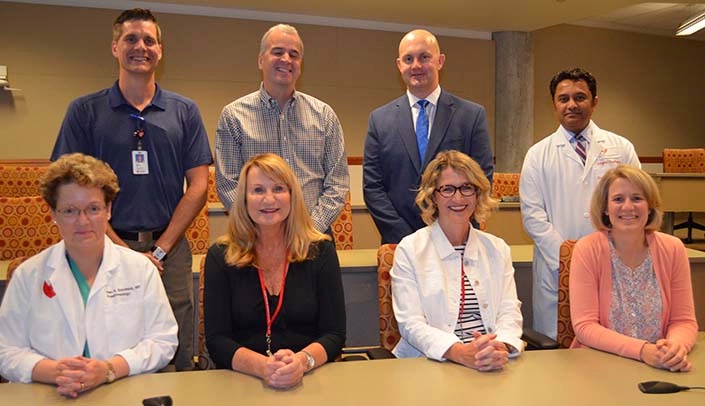The innovative funding model for graduate medical education (GME) at UNMC/Nebraska Medicine was published in the American Journal of Surgery this summer as a potential template for other academic medical centers and clinical enterprises to emulate.
UNMC and ACGME
UNMC has strong connections to the Accreditation Council for Graduate Medical Education (ACGME), which sets the standards for GME in the U.S.
In 2016, Rowen Zetterman, M.D., was appointed chair of the ACGME governing board. Dr. Zetterman, who is associate vice chancellor for planning, director of faculty mentorship programs, and professor of internal medicine, will serve a two-year term as chair of the governing board.
When Dr. Zetterman completes his term in 2018, Dr. Gold is slated to succeed him as chair of the ACGME governing board.
“For this paper to be accepted in this peer-reviewed journal says a lot about the quality of our GME funding model,” said Chandra Are, M.D., the designated institutional official (DIO) and associate dean for graduate medical education for the UNMC College of Medicine. “We have a novel plan that can be a model for the rest of the country.”
As DIO, Dr. Are oversees all 56 of UNMC’s residency and fellowship programs, which include more than 500 trainees.
“At many places, the hospital and their GME offices don’t always function in a synchronous fashion,” said Dr. Are, who is the Jerald L. & Carolynn J. Varner Professor of Surgical Oncology and Global Health. “At UNMC/Nebraska Medicine, the hospital and the GME office work very closely in many avenues. In this avenue, the hospital provides the funding and delegates the responsibility of distribution of funds to the GME Finance and Workforce Committee (GMEFWC).”
Dr. Are, who is the lead author on the paper, said restructuring of UNMC’s GME funding began in 2014 when Michael Wadman, M.D., the senior author on this paper, was named the DIO. In 2015, the GME funding model at UNMC was one of just three abstracts to be selected from among 69 abstracts to be presented during the “Hot Topics session” at the Academic Surgical Congress in Las Vegas.
Dr. Wadman served as DIO for three years before being named chair of the UNMC Department of Emergency Medicine in 2016. Dr. Are was named DIO in February of this year.
“This is a perfect example of how our medical center can lead the world,” said UNMC Chancellor Jeffrey P. Gold, M.D. “It shows how our hospital and College of Medicine came together to create a unique plan that has become a model for other academic medical centers. I couldn’t be more proud.”
Dr. Gold, who was one of the contributing authors on the paper, also serves as chair of the Nebraska Medicine board.
“The funding model is possible because we have a strong and positive relationship with the hospital,” Dr. Are said. “I like to call it a collaboration between the C suite (the hospital CEO) and the D suite (the dean of the College of Medicine).
“We were very mindful of the scarcity of resources. We changed our mindset to take a more pragmatic and Spartan approach to every dollar we spend.
“We examined each program carefully and asked the tough questions – is it needed? Should it continue? We tried to be fair, even and transparent – for now and into the future. We made it uniform and consistent across the board. We took out bias. It was all based on workload.”
Dr. Are said the key role of residency program directors was recognized early on, which resulted in securing protected time for them.
He said the novel funding model would not have been possible without the selfless efforts of all the members of the GMEFWC, and he expressed his gratitude for the leadership of UNMC/Nebraska Medicine.
“This shows that we walk the walk when we say we support education,” Dr. Are said. “The model has paid dividends by allowing program directors to focus their efforts on the training programs, some cost savings and providing funding for innovative research to help with patient safety and quality.”

Congratulations to the GME team!!